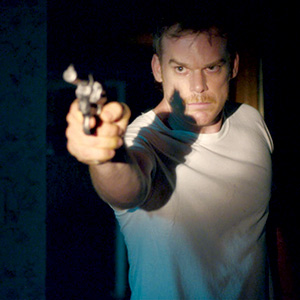

The Texas noir Cold in July unfolds its twists lazily but surely; questions of emphasis smooth the changes of mood from a decent man’s shock, to the avidness of a trio of hunters on the trail of bad men. Director Jim Mickle, working from a novel by the all-purpose action writer (and Texan) Joe R. Lansdale, starts with a troublingly calm painting of a lake on a summer night. He pulls back slowly to reveal a middle class living room. In the bed nearby Richard (Michael C. Hall, of Dexter and Six Feet Under) and his wife, Ann (Vinessa Shaw), are awakened by the sound of an intruder. Mickle stages what happens authentically, from the terror of the householders, to the pistol that goes off by accident, to the clean-up afterwards: the painting we saw ends up thrown out on the sidewalk next to the trash cans, spattered with the burglar’s brains.
Richard, who has a picture-framing shop, is still in shock, and there’s noticeable friction between Ann and Richard from the aftermath of their home being violated. He can’t handle the high-fiving: “I heard you got one!”
Mickle makes sure we get all this before taking a turn into more trad-noir territory. Guilty and obsessed, Richard watches the funeral of the man he killed from his car. Suddenly, Ben Russell (Sam Shepard) pops up in his window: the nearly silent, crop-haired, just-out-of-Huntsville father of the dead man. He comments that Richard has a very nice young son whose picture he saw in the newspapers.
The Tangerine Dream-style keyboards on the soundtrack threaten us with the 1,000th version of Cape Fear; the cops are all hat and no protection, hands tied as always. Shepard is ominous, but he’s mannered—doing that little nervous flicking thing with the lighter Steve McQueen used to do. We have to wonder how he can walk through walls and window bars, as when he sets up a tableau of a wounded teddy bear and scattered bullets in Richard’s kid’s crib.
That’s when the cops reveal themselves as not inept, but devious, and Richard starts playing offense. We noticed he drove a milquetoast Country Squire early on, now we see the lid rise over the recessed headlight of the station wagon, and it looks like the Batmobile waking up. About a third of the way in, an engagingly confident Don Johnson turns up as a smooth detective piloting a big red convertible called (according to its license plate) “The Red Bitch.” Mickle lines the film with defunct viewing formats (VHS tapes and drive-in theaters) and ominous, Lynchian elements of the evil the men are doing. Cold in July is not deep, but it’s built, and all around it looks like it was made by artisans who knew what they were doing.
Not rated; 109 MIN.



